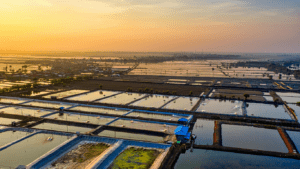When it comes to caring for a newborn’s delicate skin, every parent wants the best. Among the many decisions you make for your baby’s well-being, choosing the right soap is a crucial one. Organic baby soap has emerged as a popular choice among parents seeking natural, chemical-free alternatives for their little ones. But what exactly is organic baby soap, and how can you ensure you’re selecting the safest and most effective option?
In this comprehensive guide, we will cover everything you need to know about organic baby soap—from what makes it different from conventional soaps to how to choose the best one for your baby. We’ll also dive into the key benefits, ingredients to look out for, and the top brands currently available in the market. By the end of this guide, you’ll be well-equipped to make an informed decision and feel confident in your baby’s skincare routine.
What is Organic Baby Soap?
Defining Organic Baby Soap
Organic baby soap is a skincare product designed specifically for infants, made from natural ingredients that are grown without the use of synthetic pesticides, fertilizers, or GMOs. Unlike conventional baby soaps that often contain harsh chemicals, fragrances, and artificial colors, organic baby soap aims to offer a safer, gentler alternative by using plant-based ingredients.
To be considered organic, these soaps must meet specific certification standards set by organizations such as the USDA (United States Department of Agriculture) or similar certifying bodies in other countries. Certified organic baby soaps are free from harmful chemicals like parabens, sulfates, and synthetic fragrances that can irritate a baby’s sensitive skin.
Conventional vs. Organic Baby Soap
The main differences between conventional and organic baby soaps lie in their ingredients and manufacturing processes. Here’s a quick comparison:
| Aspect | Conventional Baby Soap | Organic Baby Soap |
|---|---|---|
| Ingredients | May contain synthetic chemicals, dyes, and fragrances | Made from plant-based, natural ingredients |
| Certification | No strict certification required | Certified by organic standards (e.g., USDA) |
| Fragrance | Often uses artificial perfumes | Uses natural essential oils or no fragrance |
| Chemical Additives | May contain parabens, sulfates, and GMOs | Free from synthetic chemicals |
Understanding this difference is key to making the right choice for your baby’s skincare needs.
Why Should You Choose Organic Baby Soap?
1. Gentle on Sensitive Skin
Babies are born with soft, delicate skin that is much more sensitive than adult skin. This means that harsh chemicals, synthetic fragrances, and preservatives commonly found in non-organic soaps can cause irritation, rashes, or allergic reactions. Organic baby soap, made with natural and hypoallergenic ingredients, is much gentler on the skin and helps maintain the skin’s natural pH balance.
2. Free from Harsh Chemicals
One of the biggest advantages of using organic baby soap is its purity. Organic soaps are free from harmful chemicals like parabens (preservatives), phthalates (used in fragrances), sulfates (foaming agents), and synthetic dyes—all of which have been linked to skin irritation and, in some cases, long-term health concerns.
3. Environmentally Friendly
Organic farming practices used to grow the ingredients in organic baby soap are better for the environment. By avoiding synthetic pesticides and harmful farming methods, organic soaps support sustainability. Additionally, many organic soap brands use eco-friendly packaging, which minimizes plastic waste and environmental impact.
4. Rich in Nutrients
Organic baby soaps often contain nutrient-rich plant-based ingredients such as shea butter, olive oil, coconut oil, and aloe vera, which nourish and hydrate the skin. These natural oils are packed with vitamins and antioxidants that help protect your baby’s skin, keeping it soft, smooth, and healthy.
Key Ingredients to Look For in Organic Baby Soap
When selecting an organic baby soap, it’s important to pay attention to the ingredients. Here are some of the most beneficial, skin-friendly ingredients often found in high-quality organic baby soaps:
1. Coconut Oil
Coconut oil is a popular ingredient in organic skincare due to its moisturizing and anti-inflammatory properties. It helps hydrate dry skin and can even soothe conditions like eczema or diaper rash.
2. Shea Butter
Rich in fatty acids and vitamins, shea butter is known for its moisturizing qualities. It creates a protective barrier on the skin that locks in moisture, preventing dryness and irritation.
3. Olive Oil
Olive oil is gentle, hypoallergenic, and rich in antioxidants. It’s an excellent ingredient for soothing irritated skin and providing deep hydration.
4. Aloe Vera
Aloe vera is known for its calming and healing properties. It’s often used to soothe skin irritation, redness, and minor wounds. Its cooling effect makes it perfect for babies with sensitive or irritated skin.
5. Calendula
Calendula extract, derived from the marigold flower, is a natural anti-inflammatory and antibacterial agent. It’s often included in baby soaps to help soothe diaper rash, eczema, and other skin conditions.
6. Chamomile
Chamomile is a calming herb with natural anti-inflammatory properties. It is gentle on sensitive skin and helps reduce redness, inflammation, and irritation.
7. Oatmeal
Oatmeal has been used for centuries to soothe itchy, irritated skin. It’s especially effective for babies with eczema, as it can help reduce inflammation and relieve itchiness.
Ingredients to Avoid in Baby Soap
Just as important as knowing what to look for in organic baby soap is understanding what to avoid. Some ingredients commonly found in conventional soaps can be harmful to your baby’s delicate skin and overall health. Here’s a list of ingredients you should steer clear of:
1. Parabens
Parabens are synthetic preservatives used to extend the shelf life of skincare products. They have been linked to hormone disruption and other health concerns, making them an ingredient to avoid in baby products.
2. Sulfates (SLS and SLES)
Sodium lauryl sulfate (SLS) and sodium laureth sulfate (SLES) are used as foaming agents in many soaps. However, these ingredients can strip the skin of its natural oils and cause dryness and irritation, especially on sensitive skin.
3. Artificial Fragrances
Fragrances added to conventional baby soaps are often made from a cocktail of synthetic chemicals, some of which can trigger allergic reactions or respiratory issues in babies.
4. Phthalates
Phthalates are used to stabilize fragrances in skincare products. They have been linked to developmental and reproductive toxicity, so it’s best to avoid them in any baby product.
5. Synthetic Dyes
Artificial dyes are often unnecessary in skincare products and can cause allergic reactions. Look for soaps that are naturally colored or free from dyes altogether.
How to Choose the Best Organic Baby Soap
Selecting the right organic baby soap can feel overwhelming, especially with so many options on the market. Here are some helpful tips to guide you through the selection process:
1. Look for Certification Labels
To ensure that the soap you choose is genuinely organic, check for certification labels such as USDA Organic, COSMOS Organic, or ECOCERT. These certifications verify that the product meets strict organic standards.
2. Read the Ingredient List
Always read the full ingredient list before purchasing any soap. Look for natural, plant-based ingredients and avoid harmful chemicals like those mentioned above. Simpler ingredient lists with recognizable components are usually better.
3. Opt for Fragrance-Free Options
Fragrance-free soaps are the safest choice for babies, especially those with sensitive skin. Even natural essential oils can sometimes be irritating, so if your baby has skin conditions like eczema, it’s best to stick with unscented products.
4. Choose Soaps with Moisturizing Properties
Look for soaps that contain moisturizing ingredients like coconut oil, shea butter, or olive oil. These ingredients help maintain your baby’s natural skin barrier and keep their skin soft and hydrated.
5. Patch Test First
Even with organic products, it’s a good idea to do a patch test on a small area of your baby’s skin before using a new soap. This helps ensure there are no allergic reactions or sensitivities.
Top Organic Baby Soap Brands
The demand for organic baby products has led to the rise of many brands offering high-quality, natural baby soaps. Below are some of the top-rated organic baby soap brands that parents swear by:
1. Dr. Bronner’s Baby Unscented Pure-Castile Soap
Dr. Bronner’s is a household name when it comes to organic skincare, and their baby soap is no exception. Made with organic coconut, olive, and hemp oils, this unscented soap is gentle, moisturizing, and perfect for sensitive baby skin.
2. Earth Mama Organic Baby Wash
Earth Mama offers a soothing, organic baby wash made with calendula and aloe vera. It’s a great option for babies with sensitive skin or those prone to rashes, thanks to its calming, non-irritating formula.
3. Burt’s Bees Baby Bee Shampoo & Wash
This all-in-one baby wash is made with natural ingredients like aloe vera and oat flour. Burt’s Bees is known for its commitment to sustainability and organic products, and this baby soap is a trusted choice for many parents.
4. Weleda Calendula Soap
Weleda’s calendula soap is a favorite among parents who prefer using herbal remedies. Infused with calendula and chamomile extracts, it gently cleanses while protecting your baby’s delicate skin from irritation.
5. Babyganics Foaming Soap
Babyganics offers a fragrance-free foaming soap that’s hypoallergenic and free from harmful chemicals like sulfates and parabens. It’s ideal for newborns and babies with extra-sensitive skin.
How to Use Organic Baby Soap Safely
Using organic baby soap correctly ensures you get the most benefit from its natural ingredients while keeping your baby safe and comfortable. Here are some tips for safe usage:
1. Use Sparingly
Babies don’t need to be bathed every day, as frequent baths can dry out their skin. When you do bathe your baby, use only a small amount of soap to gently cleanse their skin.
2. Lukewarm Water Only
Always use lukewarm water (around 98.6°F or 37°C) for your baby’s bath. Hot water can dry out and irritate their skin, while cold water can be uncomfortable.
3. Rinse Thoroughly
Make sure to thoroughly rinse off all soap residue from your baby’s skin. Leftover soap can lead to irritation or dryness.
4. Moisturize After Bathing
After your baby’s bath, apply an organic baby lotion or oil to lock in moisture and keep their skin hydrated. Look for products with ingredients like coconut oil or shea butter for maximum hydration.
Final Thoughts
Choosing the right organic baby soap is an important step in protecting your baby’s skin and overall health. By opting for organic, plant-based ingredients, you can avoid harmful chemicals and provide your little one with the gentle care they deserve. Remember to check for certifications, carefully read ingredient lists, and consider your baby’s specific skincare needs when selecting a product.
With a wide variety of organic baby soaps available, finding the right one might take some research, but the benefits to your baby’s skin and the peace of mind it brings make it well worth the effort.




